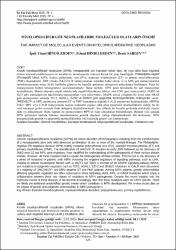Miyeloproliferatif neoplazilerde moleküler olayların önemi
Künye
Hindilerden, İ. Y., Hindilerden, F. ve Sargın, F. D. (2015). Miyeloproliferatif neoplazilerde moleküler olayların önemi. İstanbul Tıp Fakültesi Dergisi, 78(4), 125-136.Özet
Kronik miyeloproliferatif neoplaziler (MPN), hematopoetik kök hücreden köken alan, bir veya daha fazla miyeloid serinin anormal proliferasyonu ile karakterize hematopoetik sistemin klonal bir grup hastalığıdır. Philadelphia-negatif (Ph-negatif) klasik MPN, başlıca polisitemia vera (PV), esansiyel trombositemi (ET) ve primer miyelofibrozisten (PMF) oluşmaktadır. 2005 yılında JAK2V617F mutasyonunun, ardından JAK2 ekzon 12 ve MPL gen mutasyonlarının tanımlanmasından sonra, farklı özellikler gösteren bu hastalık grubunun patogenezi anlaşılmaya başlamıştır. Fakat bu mutasyonların hiçbiri heterojeniteyi açıklamamaktadır. Bunu takiben, MPN tanılı hastalarda bir seri mutasyonlar keşfedilmiştir. Bunlar arasında sinyal yolaklarında negatif düzenleyici etkileri olan LNK geni mutasyonları, IKZF1 ve Tp53 gibi transkripsiyon faktörlerinin mutasyonları veya delesyonları, MAPK sinyal yolağının bir üyesi olan NRAS geni mutasyonları yanında TET2, ASXL1, EZH2 ve IDH1/2 gibi epigenetik düzenleyicilerdeki mutasyonlar vardır. JAK2V617F ve MPL mutasyonu olmayan ET ve PMF hastalarının çoğunda CALR mutasyonu bulunmaktadır. MPN'de JAK2, MPL veya CALR mutasyonunu taşıyan hastaların çoğuna eşlik eden epigenetik anormalliklerin varlığı, bu iki sınıf mutasyon grubu arasında ilişki olduğunu düşündürmektedir. Son yıllarda bu hastalık grubunda moleküler olaylar daha iyi anlaşılmıştır. Buna rağmen bu mutasyonların MPN'ye özgü olmadıkları bilinmektedir. Bundan yola çıkarak MPN gelişimine katkıda bulunan tanımlanmamış genetik olayların varlığı düşünülmektedir. Bu derlemede, MPN patogenezinde genetik ve epigenetik anormalliklerinin rolü hakkında güncel veri özetlenmiştir. Chronic myeloproliferative neoplasms (MPNs) are clonal disorders of hematopoiesis resulting from the transformation of a hematopoietic stem cell, with abnormal proliferation of one or more of the myeloid lineages. The Philadelphianegative (Ph-negative) classical MPNs mainly comprise polycythemia vera (PV), essential thrombocythemia (ET) and primary myelofibrosis (PMF). The identification of JAK2V617F mutation in early 2005 followed by the discovery of JAK2 exon 12 and MPL gene mutations, have modified the understanding of the pathogenesis of these various disease entities. However, all these mutations fail to explain the heterogeneity of these entities. This has led to the discovery of a series of mutations in patients with MPN involving the negative regulators of signaling pathways, such as LNK, mutated or deleted transcription factors such as IKZF1 and Tp53, a member of the MAPK signaling pathway NRAS, and mutations in epigenetic regulators such as TET2, ASXL1, EZH2 and IDH1/ 2. Mutations in CALR were discovered in a majority of JAK2V617F-and MPL-negative ET and PMF patients. Among MPN patients, genetic abnormalities affecting epigenetic regulation are often expressed in those harboring JAK2, MPL or CALR mutations which imply a collaboration between these two classes of mutations in MPN pathogenesis. Despite the recent insights into the molecular events of these diseases, it has become increasingly clear that these mutations were not MPN specific. There are likely yet additional unidentified genetic events which contribute to MPN development. We review recent data on the impact of genetic and epigenetic abnormalities in MPN pathogenesis.
Kaynak
İstanbul Tıp Fakültesi DergisiCilt
78Sayı
4Koleksiyonlar
- Makale Koleksiyonu [3777]
- WoS İndeksli Yayınlar Koleksiyonu [6631]


















